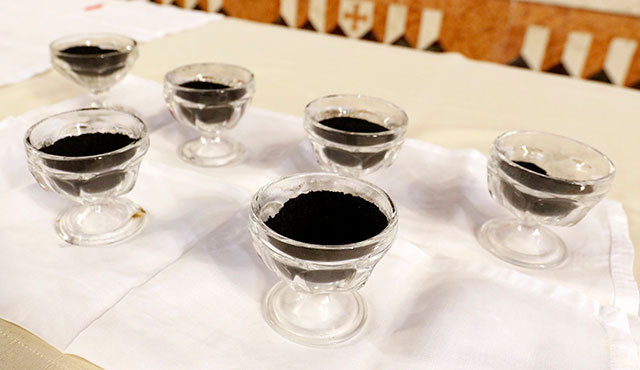The imposition of Lenten ashes on Ash Wednesday, like so many things during this pandemic, may be done differently in your parish this year.
“Because the expectation is that transmission rates for COVID-19 will still be elevated as Lent begins, the Diocese of Orange has evaluated its liturgical procedures in light of these unusual times,” says Lesa Truxaw, director of the Diocese of Orange Office for Worship.
After blessing the ashes and sprinkling them with holy water in silence, the priest will address those present in general (not individually) with the words “Repent, and believe in the Gospel,” or “Remember that you are dust, and to dust you shall return.” The priest will then put on a mask prior to dispensing ashes.
Directives sent out from the Congregation of Divine Worship and Discipline of the Sacraments in Rome asked that ashes be sprinkled on the heads of the faithful. While it is still possible to dispense ashes by making a cross on the foreheads, these directives for distributing ashes in times of a pandemic reduce the risk of exposure.
“In much of the world, this is the normal way of distributing ashes on Ash Wednesday,” says Truxaw, adding that the Roman Missal doesn’t describe the manner in which ashes are dispensed. It says, “The priest places ashes on the head of all those present who come to him.”
Truxaw stresses that ashes are the external sign of the commitment of those receiving them to repent. The most important part of Ash Wednesday is the actual commitment, not the ashes themselves. Receiving ashes is not a requirement to enter into Lent with a repentant heart, especially for those that are uncomfortable receiving ashes this year.
LENTEN FASTING
In the dioceses in the United States, Catholics ages 18 through 59 are bound to fast on both Ash Wednesday (Feb. 17, 2021) and Good Friday (April 2, 2021). No Catholic will lightly hold himself excused from this penitential practice.
To fast means to consume one full meal a day at most, although taking of other, smaller quantities of food at the other customary mealtimes is permitted. Food and drink between meals (excepting water and medicine) is not permitted on fast days.
ABSTINENCE FROM MEAT
Catholics aged 14 and up are to abstain from meat on Ash Wednesday, all Fridays of Lent, and Good Friday.
To abstain means refraining from eating beef, veal, pork, or poultry at least, although eggs and milk products are acceptable. The consumption of fish and shellfish is permitted, though the penitential character of the abstinence should be kept in mind.

